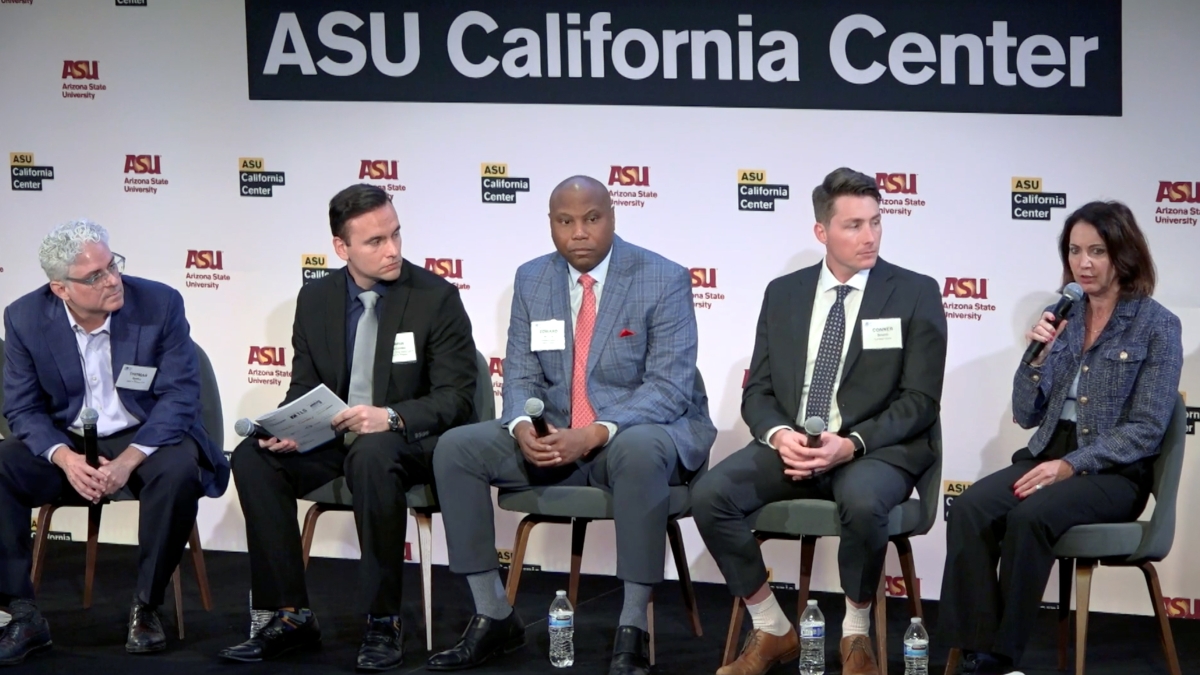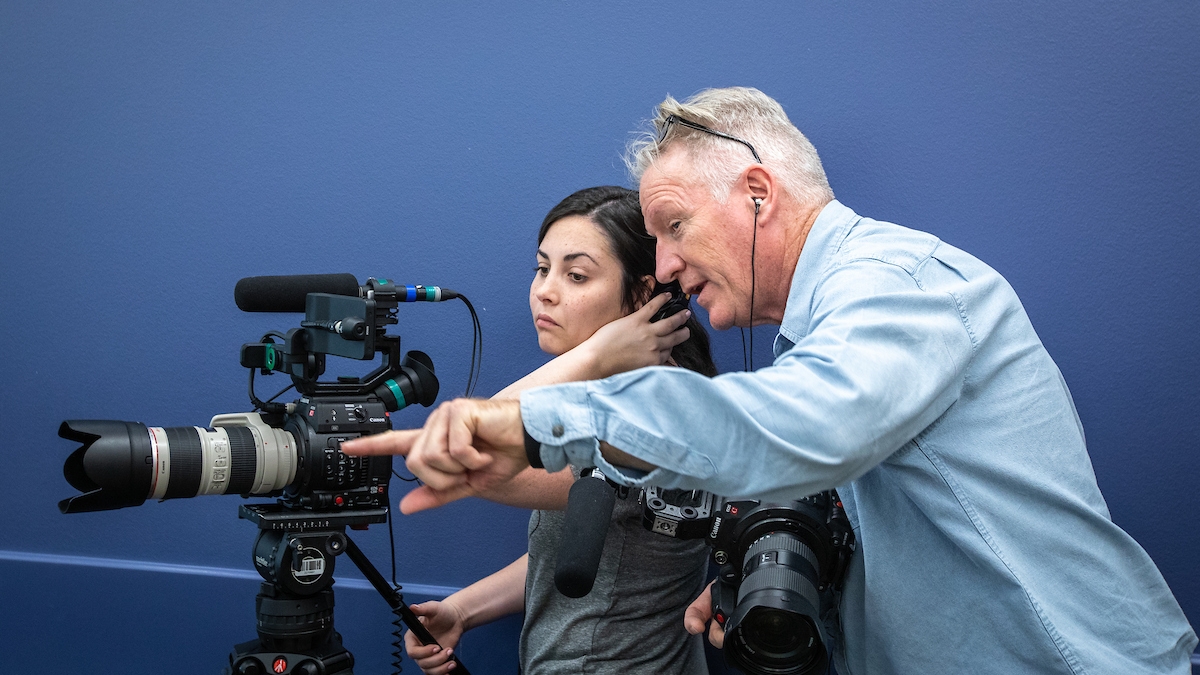Arizona State University researchers work all over the world from Antarctica to Mexico and Tucson to Pasadena, and a group of journalists and storytellers from the Cronkite School is following them and chronicling their research for a high-quality science series for PBS.
“Catalyst” returns to Arizona PBS Wednesday for a highly anticipated second season, featuring host Vanessa Ruiz, a Walter Cronkite School of Journalism and Mass Communication professor of practice and former co-lead anchor for 12 News, the NBC affiliate in Phoenix.
The 13-episode series explores current cutting-edge research at ASU and is the creation of students at the Cronkite School. The show aims to serve the public, executive producer Steve Filmer said. He said last year was a learning experience; this year will be a step in a new direction.
“We like to go to big, bold places if we can,” said Filmer, an award-winning television producer whose credits include ABC World News Tonight and Good Morning America. “We’re really trying to put more of the stories in the field and on location rather than in a safe and controlled environment. Doing stories on location is fun and full of challenges. It forces us to be spontaneous and it freshens up the show.”
This year's segments include an ASU School of Life Sciences researcher who visited the Phoenix Zoo to study cancer rates among larger animals, as well as an ASU molecular science biologist who went to the Barrett-Jackson auto auction in Scottsdale to draw a connection between "biological engines" and cars.
“Catalyst” is supported by ASU Knowledge Enterprise Development, which promotes interdisciplinary university research institutes and initiatives.
“Catalyst is a wonderful opportunity to share the latest discoveries and cutting edge research coming out of ASU,” said Sethuraman “Panch” Panchanathan, executive vice president of Knowledge Enterprise and chief research and innovation officer at ASU. “In Season 2, the Catalyst team focuses a lens on how ASU scientists are looking at crucial topics from new perspectives such as — how have animals managed to overcome health problems that humans still face? How does space technology help us understand Earth environments? I invite you to watch another successful season and join us on this inspirational journey of discovery and impact.”
Each episode of the 30-minute show features four to five segments which attempt to demystify research by telling the stories of people in the labs and out in the field, spotlighting the pursuit of groundbreaking discoveries.
It will air every Wednesday at 9 p.m. on Arizona PBS, beginning on Feb. 13. Encore broadcasts will air Sundays at 2 p.m.
Students say they are receiving invaluable experience working on all dimensions of the show, from story conceptualization to research, shooting, editing, writing and production. One Cronkite student said his tenure on the show is already paying off.
“Being immersed in all of this equipment and being able to touch and feel it and memorize it will make me more valuable way down the line no matter what field I go into in journalism,” said 19-year-old sophomore Will Everett, who serves as a production assistant on the show.
Students at the Cronkite School, the home of PBS, started working on the second season in late August. The production supports the state’s mission of promoting lifelong learning by filling the need for more discovery-related content on television.
Each student is assigned to come up with four stories for the semester, depending on their tastes, research and discoveries.
Serena O’Sullivan, a 22-year-old senior, said she enjoyed working on a segment called “It Turns Out Dead Men Do Tell Tales,” featuring the work of Gwyneth Gordon, a research scientist in ASU’s School of Earth and Space Exploration. Gordon is currently conducting isotopic analysis for unidentified human remains from along the U.S.-Mexico border. According to U.S. Customs and Border Protection, 7,216 people have died crossing the border between 1998 and 2017.
“She’s trying to figure out which isotopes come from certain regions,” O’Sullivan said. “It’s exciting that an ASU researcher can possibly help make that breakthrough in identifying these unidentified bodies.”
Steph Amaya, a 22-year-old senior producer, said she connected with a story about a California-based company that wants to send a Mars2020 rover to the moon and is testing it on Arizona soil.
“I didn’t realize the whole aspect of what it takes to send a rover to the moon,” Amaya said. “How you have to pitch your rover to NASA and ask them to fund it. This particular group of scientists want to send a rover to the moon to figure out more about the moon’s history.”
Everett, who is a production assistant, said he’s been spellbound by the story of a marathon runner who is transitioning from male to female and the research of Siddhartha Angadi, an assistant professor in the College of Health Solutions.
“We go along with her on this journey and take note of all her physical changes as she transitions through sex reassignment medication,” Everett said. “It’s a very scientific story but we’re giving it a personal touch and telling it in an engaging way.”
Jim Tuttle, "Catalyst’s" postproduction supervisor, said for every finished minute of film, it takes about 15 hours of production work to get it ready for broadcast.
“Every story is a different animal but this is typical with a high-quality show,” he said.
Other stories in production include NASA’s Orion parachute test, ASU’s first study abroad journey to Antarctica and urban heat islands.
This year “Catalyst” also enlisted two students from ASU’s School of Music, part of the Herberger Institute for Design and the Arts, to create and score a new opening theme and end credits for the show.
Top photo: Bailey Netsch, a former student in the Walter Cronkite School of Journalism and Mass Communication, receives professional tips from Cronkite Professor of Practice Steve Filmer in April 2018 as they shoot video for the inaugural season of the PBS series "Catalyst." The show returns for a second season on Wednesday, Feb. 13. Photo by Charlie Leight/ASU Now.
More Law, journalism and politics

TechTainment conference explores the crossroads of law, technology, entertainment
What protections do writers, actors, producers and others have from AI? Will changing laws around name, image and likeness (NIL) eliminate less lucrative college sports?And what does the No…

How to watch an election
Every election night, adrenaline pumps through newsrooms across the country as journalists take the pulse of democracy. We gathered three veteran reporters — each of them faculty at the Walter…
Law experts, students gather to celebrate ASU Indian Legal Program
Although she's achieved much in Washington, D.C., Mikaela Bledsoe Downes’ education is bringing her closer to her intended destination — returning home to the Winnebago tribe in Nebraska with her…
